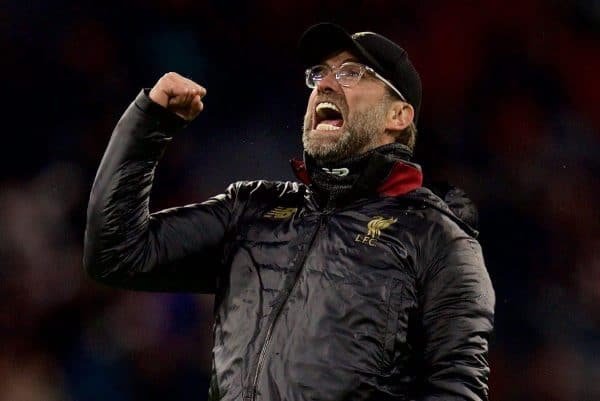‘Hand it over Manchester‘ rang out from the away end at the Etihad as Liverpool went 11 points clear at the top of the table – and if the manner of the performance was anything to go by, Madrid could be handing over another piece of silverware come May too.
Despite the Reds surrendering 66 percent of the ball to Pep Guardiola’s team, they maintained a control in the match that has been lacking in recent weeks.
However, this wasn’t the possession-based domination from earlier in the season that ‘kills the opposition with passes’.
Instead, it was a control that limited the opposition to minimal half-chances and constant futile crosses. Liverpool went out with the objective of thwarting Man City, a mission they pulled off to perfection.
A European approach

Go away, keep a clean sheet and bring them back to Anfield.
That has always been a mantra for Liverpool teams in Europe and it has served fantastically down the years – 10 trips to European Cup finals tells us as such.
Jurgen Klopp‘s Liverpool tended to be different, however. There were no redesigns and no fear in the face of giants. This wasn’t a lack of respect but more a confidence in their own abilities.
They were certainly right to stick to their guns of course, conquering the continent with an incredible record in knockout ties as they reached the final in four of Klopp’s first six European campaigns at Liverpool.
Adaptations were obviously made for different opposition – it would be naive and disrespectful to the German’s staff to suggest otherwise – but these were always done with a view to ensuring the Reds could play their own game.


Even under Arne Slot, that had tended to be the way until this weekend.
What we saw at the Etihad, though, was another side to Slot’s coaching – a side closer to Rafa Benitez’s Liverpool than that of Klopp.
Liverpool’s 34 percent possession in their 2-0 win at Man City was their lowest on record (since 2003/04) for an away Premier League win.
Perhaps it was no coincidence that our last win at the Etihad, in the 2017/18 Champions League, saw them hold just 36 percent of the ball.


Sunday’s triumph wasn’t a smash-and-grab, however. Instead, it was a controlled display that limited Alisson to just one difficult stop.
Guardiola’s side, though clearly not what they once were, are able to hold possession well thanks to their players’ technical quality.
Slot decided to avoid playing Man City at their own game, and it paid off.
With similarly excellent individuals scattered across PSG’s squad, the Etihad performance could act as a blueprint for the Reds’ trip to the Parc des Princes in the last 16 of the Champions League.
Set-pieces could be key


Against Man City, a set-piece got Liverpool off the ground, something we haven’t been able to say enough this season.
“If you want to win a big game then you need to have a neutral balance in set-pieces or a positive one,” said Slot on Sunday.
“We scored from a set piece and that gives you such a boost for this game because, at that moment of time, it wasn’t that we were dominating the game.
“It wasn’t expected that we could score at any second, so yeah, set-pieces are vital.”
Goals from corners was an area Benitez used to make full use of thanks to Sami Hyypia’s presence. If Liverpool can become as good from corners as they were under Klopp, too, they will gain another tool useful for crafting wins when not at their best.
No recognised striker


The main talking point when team news arrived on Sunday was Liverpool’s lack of a striker, leaving Curtis Jones to figure as the Reds’ most advanced player in the press.
There were mitigating factors that led to only two recognised forwards, Mo Salah and Luis Diaz, starting.
Cody Gakpo had only trained once, meaning he started on the bench, and Diaz played on the left while Diogo Jota wasn’t “fully recovered,” as the Portuguese put it to Slot on Saturday.
Darwin Nunez, however, was an option, and Slot’s explanation of why he didn’t play indicated he planned to sit back from the start.
“I felt if you play at City you have to defend a lot, so Darwin has had an impact whenever we needed him but his main strength isn’t defending in and around his own box,” the head coach began.
“So, some extra legs with a midfielder was then the decision we made.
“We wanted to play with two wingers because if you only defend you have no choice, to have two wingers who are fast and we can play the ball in-behind to always gives us an opportunity to create.
“Then we have extra players to win the second ball, I think it worked out quite well – although they had a lot more ball possession than us.”
Slot’s versatility is a strength


Slot’s adaptability can be another weapon in Liverpool’s armoury.
We want the squad to be confident in their own ability – we do not want them dictated to. However, if the players still feel the coach is getting the best from them, these tactical tweaks can be no bad thing if executed correctly.
After the game, Jones spoke about how Slot has “always got a plan for how they (the opposition) will come and press, how we’ll go and move and how don’t we go and move the rest of the lads around.”
He isn’t the first and won’t be the last to comment on the Dutchman’s versatility.
Much was made when Ruben Amorim arrived at Man United about the system he wanted to play. He has stuck to the style that worked for him previously, no matter how unsuccessful for his new club in the short term.
Slot’s approach has been far more malleable. He was hired to get the best out of the players at his disposal and, to Liverpool’s advantage, he isn’t letting pre-conceived theories get in the way.










